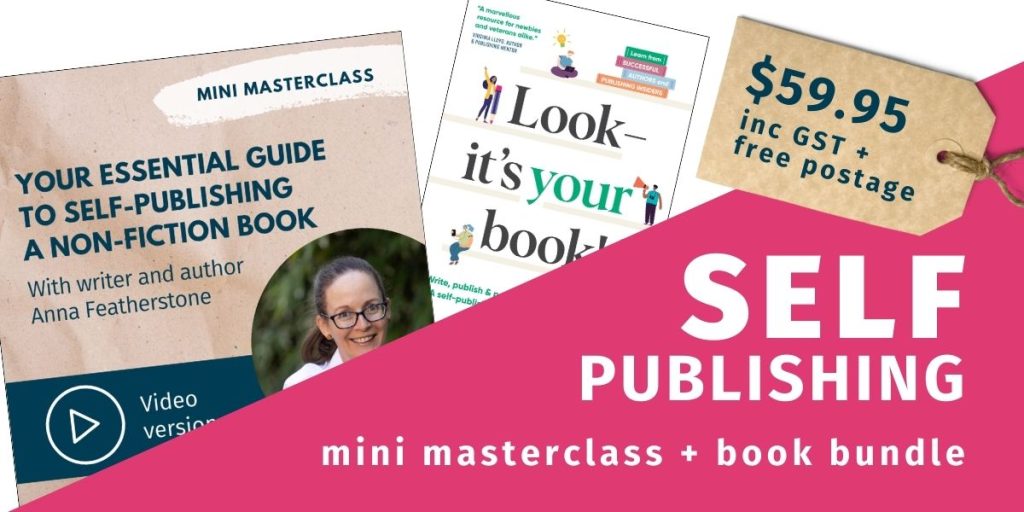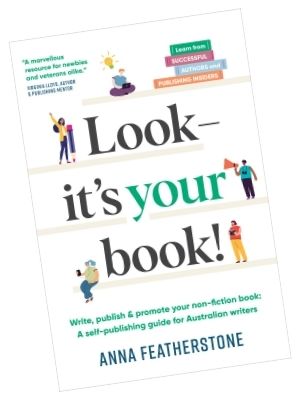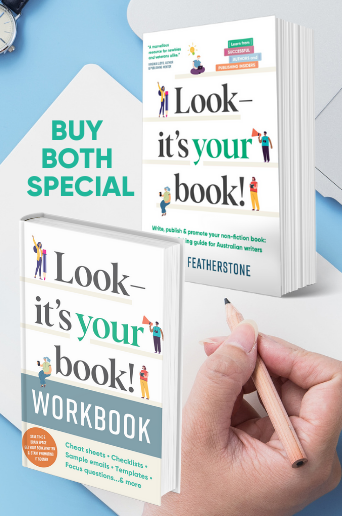

by Rachel Smith
24 February 2022
If you’re writing a book, or have a nugget of an idea that you know would find an audience in the world, self-publishing could well be the way to go. There are lots of reasons why, but we’re going to pass the baton over to someone who knows better than most: author Anna Featherstone, who actually ran a brilliant mini masterclass for us – and was inspired afterwards to write an incredible book on self-publishing.
For a limited time, we’re bundling the masterclass and the book in the Toolkit – grab it now.


Below, get a sneak peek with an exclusive excerpt from © Look – It’s Your Book! Write, Publish & Promote Your Non-Fiction Book: A Self-Publishing Guide for Australian Writers. Reprinted here with the permission of author Anna Featherstone.
This chapter is all about the type of publishing where you get to be the boss. You choose to do the work you like, are good at—or want to learn to be good at—and you also get to choose to delegate the rest, and to who.
Hurrah! You don’t need to be famous or have hundreds of thousands of fanatical followers on your socials. You don’t need to have married a Hollywood film star or been her personal trainer, won gold at the Olympics, or invented the cure for cancer. All of those would be great, of course, but even if you had done all of them, it still doesn’t guarantee you a palatable book deal with a traditional publisher.
Introverts can self-publish. Extroverts can self-publish. We don’t need to prostrate ourselves on the front doormat of literary agents, sidle shyly up to publishers at festivals or spend dog years perfecting the ultimate email pitch or dredging ourselves out of the slush pile.
We can avoid the whole rigmarole and just give ourselves permission to publish.
You want permission? Permission granted!
The self-publishing approach means keeping all rights to your work and enjoying the freedom of being able to repackage and repurpose the content, in any shape or form, for any outlet or medium you choose … forever!
You can pull books from publication if you decide to take a different path, or you can launch offshoots or more books in the series.
You can sign deals with foreign agents for translations or bring out an audio version. You can slice and dice your content into podcast format, merchandise, or turn the concept of your book into a thriving consulting business. You can do whatever you like because you, and only you, own the IP.
Though you’ve had to back the venture financially from the start, you’ll also benefit financially by retaining 100% of the profits till the end. That’s right, you get full royalties, instead of just 5%.
Yes, this heading sounds all wrong but, because you don’t need to split your book income with a publisher, it means your profit per book is way higher, so you don’t need to sell as many! That’s right, you might make $10–$20 profit on a $30 book sale instead of just $1–$3. For example, at the time of writing, Small Farm Success Australia has sold more than 2,000 paperback copies (and is still going strong) at $29.95 ex-GST (RRP is $33 including GST). With a traditional publisher, at an 8% royalty, this would equal a gross income of around $5,000, but by self-publishing the book I was able to increase that gross income close to tenfold, plus earn 70% commission on hundreds of more ebook sales, and parlay it into consulting opportunities too. I’ve also received 100% of the income from lending rights and copyright schemes (more on those opportunities and how to apply for them in Chapter 50).
I’m not much for sitting around waiting for people to make decisions about my future. How about you?
If you have an urgent or timely message or idea you want to get out, and you’re not prepared to wait for the 1 to 3-year publishing cycle of a traditional publisher (which is on top of your writing time!), you can turn things around quickly and just get your book out to market ASAP.
It means your book will be timely and, thanks to the flexibility of ebooks and POD (see Chapter 24), you’ll be able to update it, as well as bring out new editions.
Publishing your book your own way allows you to create spin-offs, including workbooks and podcasts, stationery and seminars, limited editions, even lyrics and lectures. Create, control, and expand your brand and empire on your own terms.
Self-publishing is a great way to test the market with your ideas and writing style. It may also help you get runs on the board to build your fan base for your next book.
Indie publishing is incredibly flexible. You can run your operation from anywhere in the world, calling the shots from your backyard, a sun-kissed beach, the local coffee shop, or a cheery co-working space. You can even do it on your commute to your regular job. You also get to set your own deadlines, whether that’s leisurely or lightning fast.
Many of the same people who design and edit for the big publishers (or have) are also available to freelance for you. This means you can outsource all the things you’re not good at or dread doing, whilst tapping into the same expertise used by the big guns of the publishing world.
Working with these freelancers can bring efficiency, expertise and great energy to your project.
Indie publishing might also be the only way to get your book into print.

For example, there’s no way a traditional publisher would have signed me to publish this book on self-publishing! Many topics are also too niche or controversial, especially given that publishers assess the value of your book through their own lens, and that lens often has a heavy commercial filter. Sometimes it’s only after you’ve achieved success on your own that they go and get their eyes checked.
Want to read more? Look – It’s Your Book! is available for order through your favourite local and online bookstore as well as direct from the publisher. Or, head to the Toolkit and grab Anna’s masterclass AND a paperback of Look – It’s Your Book in a limited-time bundle!